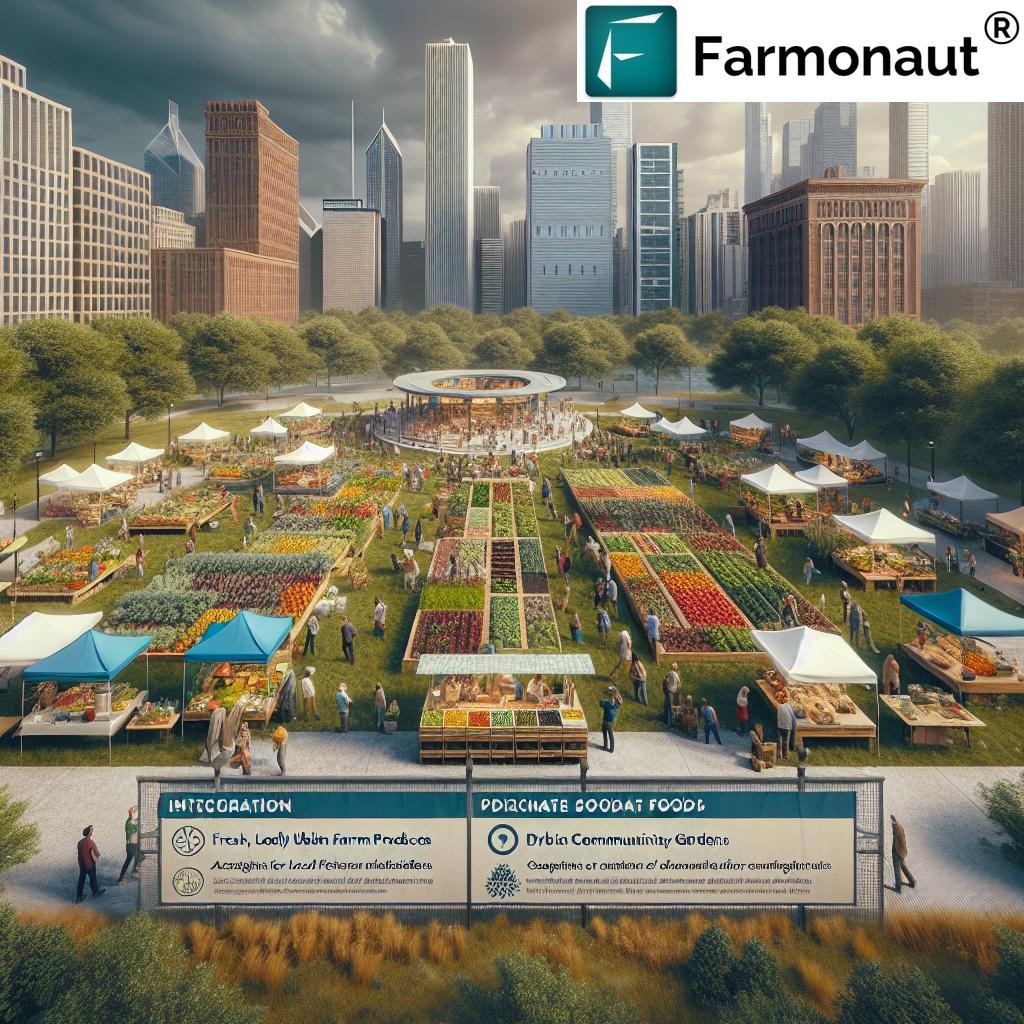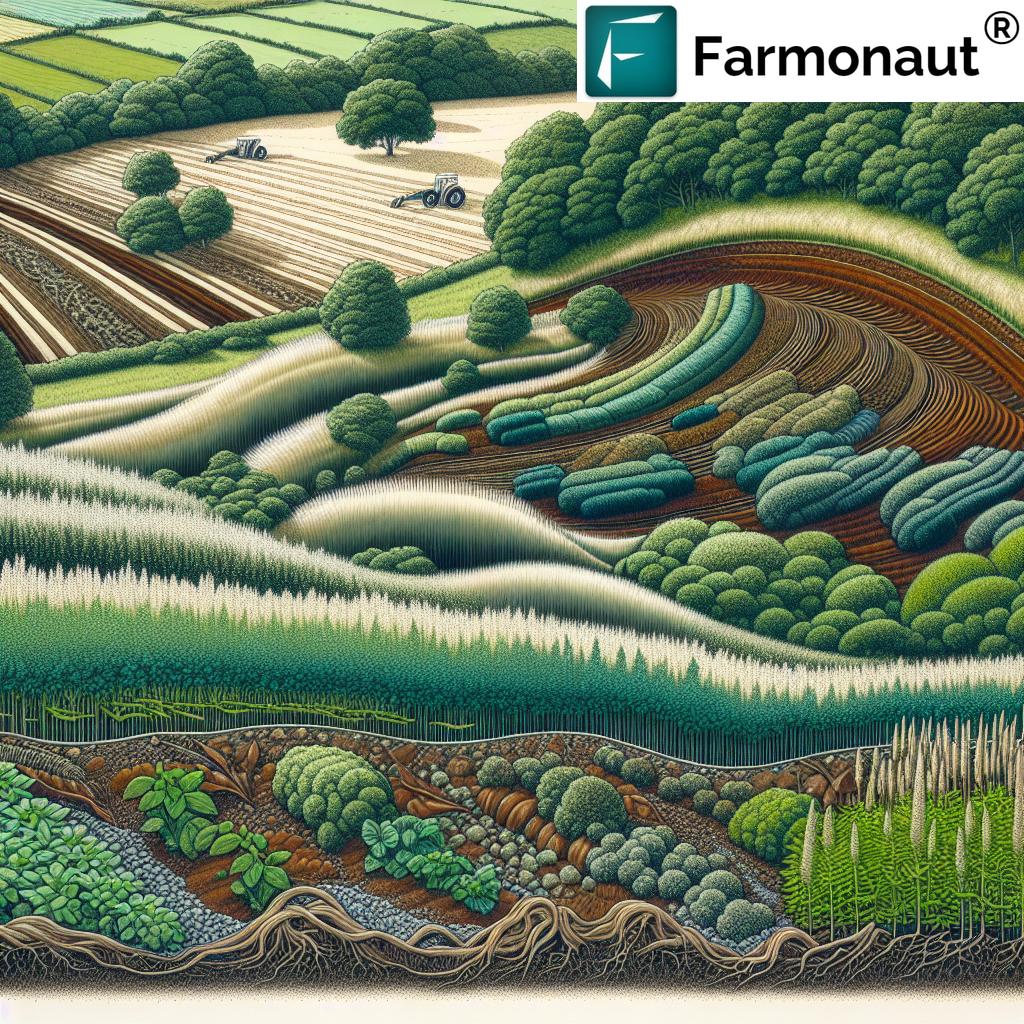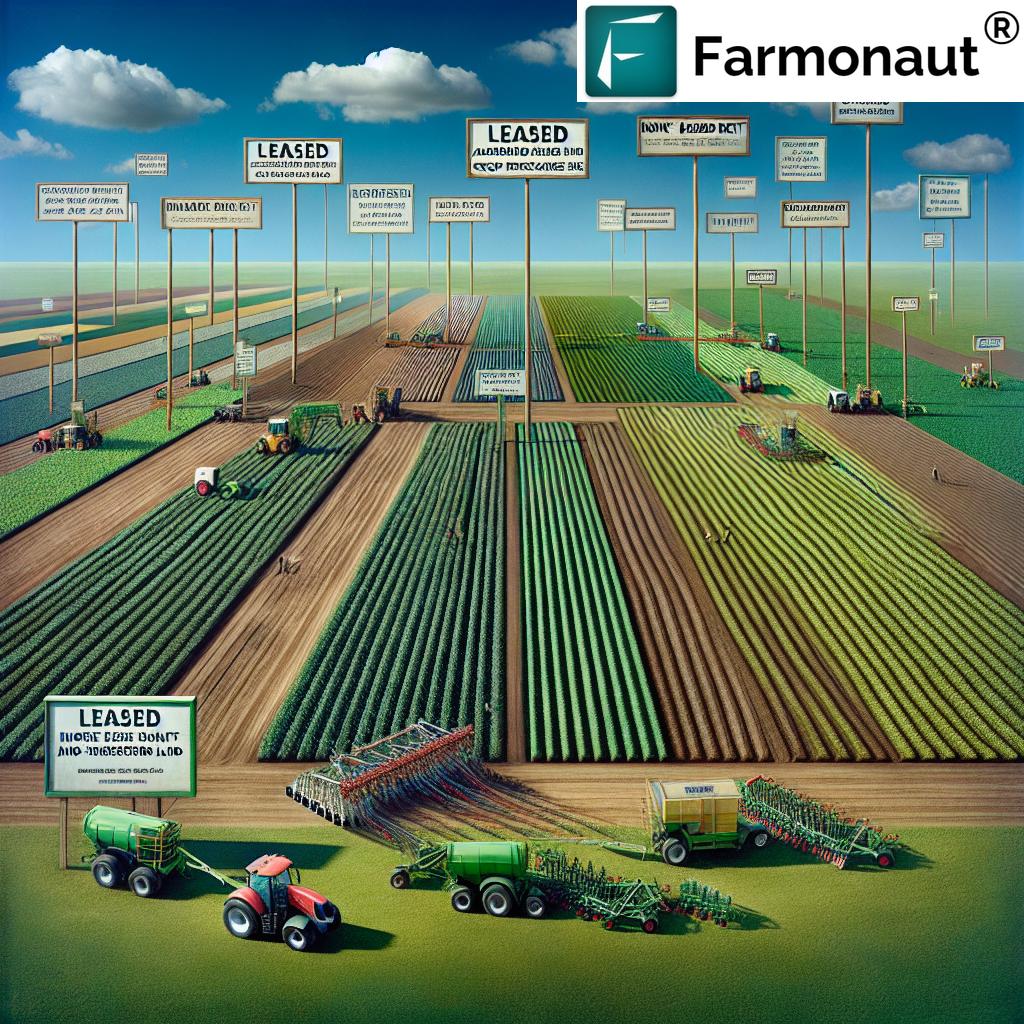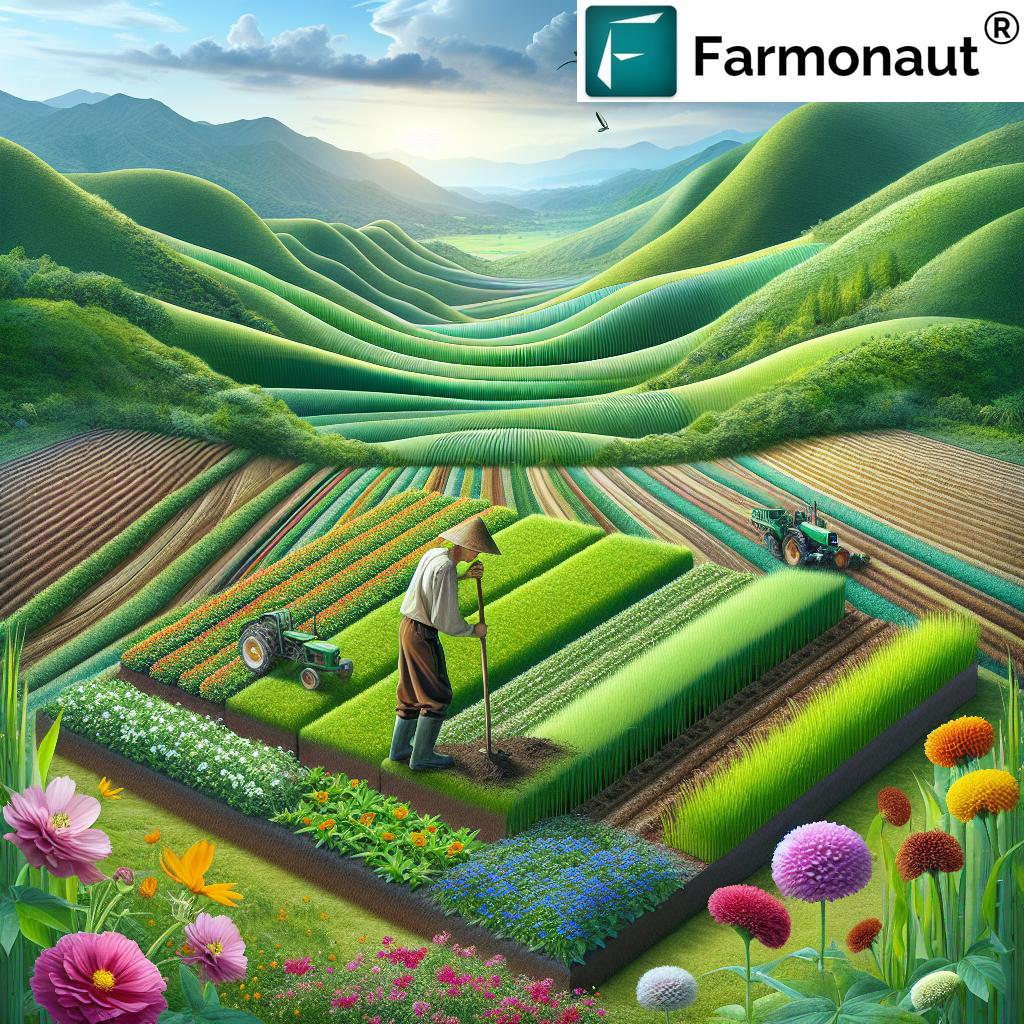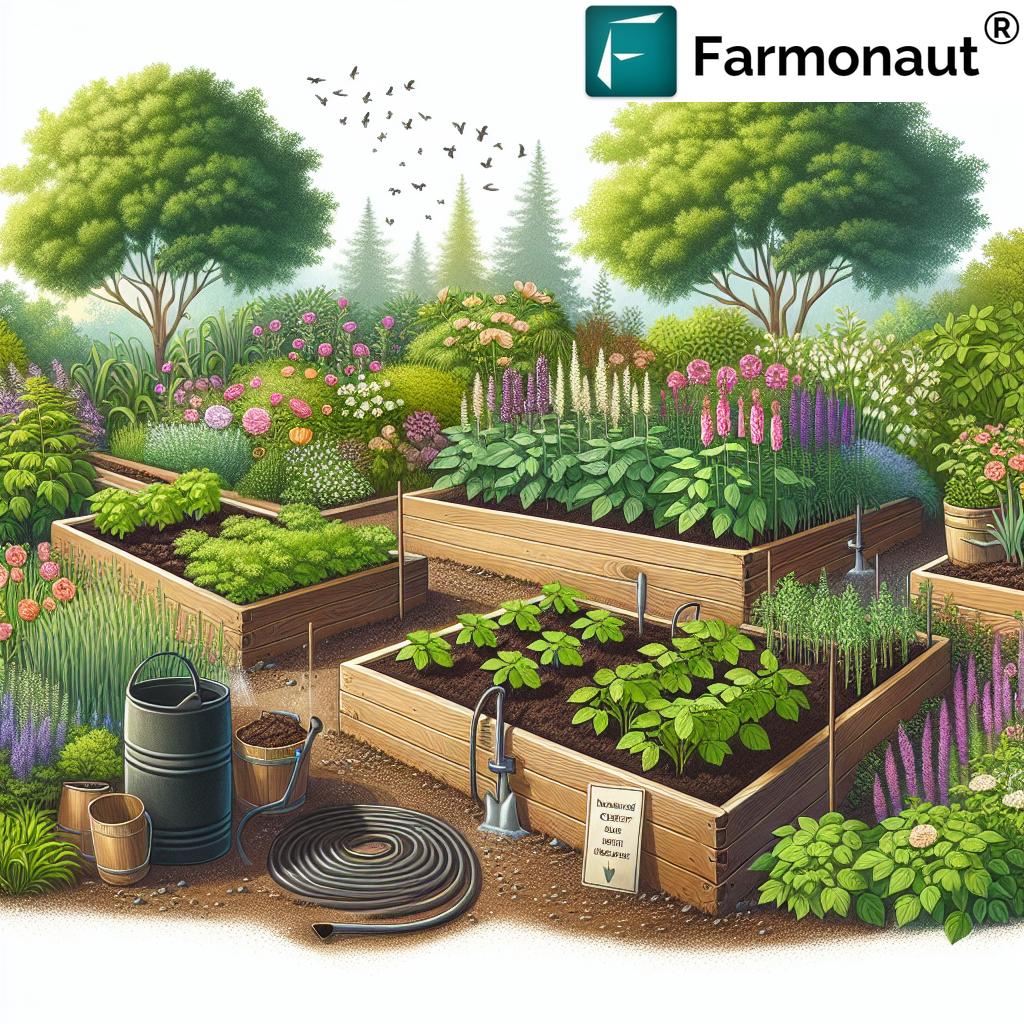Unlocking Food Justice: A Student’s Journey Through Sustainable Urban Agriculture in Illinois
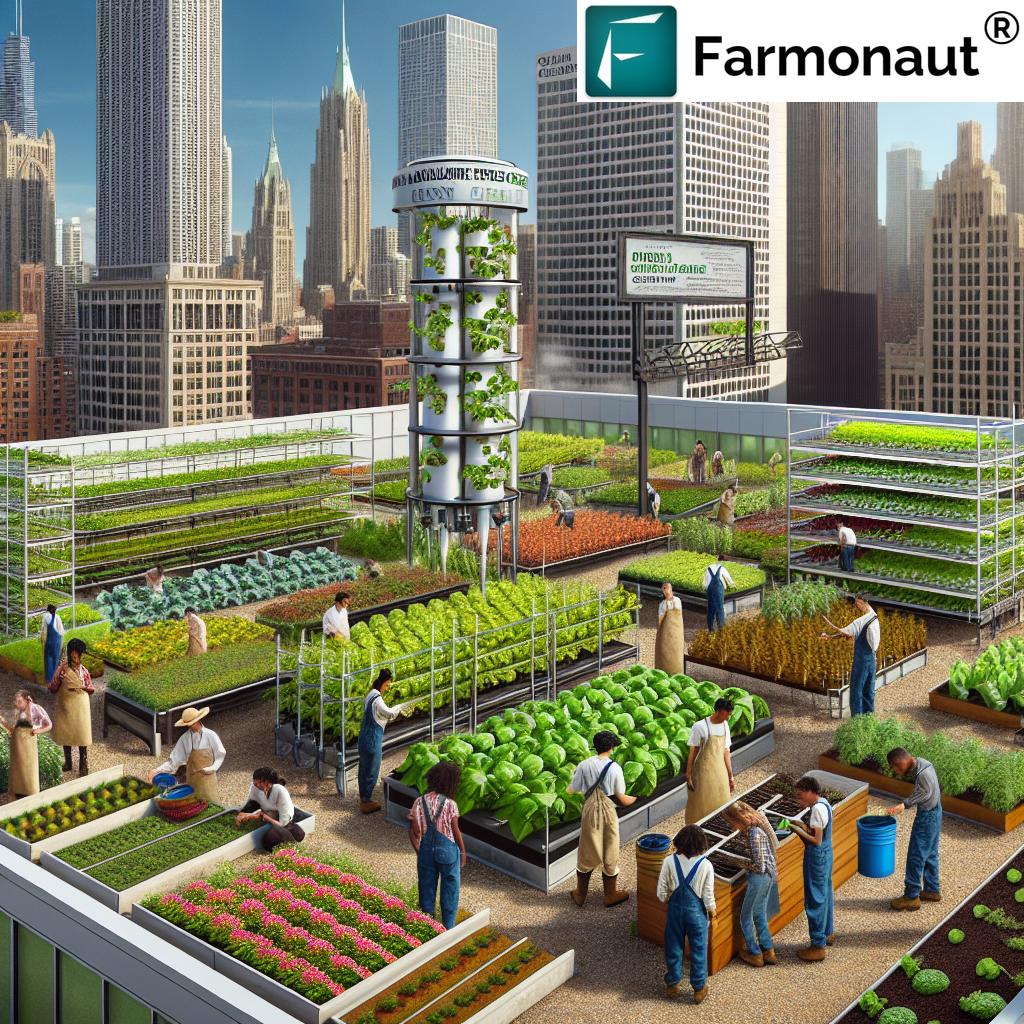
“Urban agriculture initiatives can reduce food transportation distances by up to 90%, significantly lowering carbon emissions.”
Welcome to our journey through the world of sustainable urban agriculture in Illinois! As we dive into this exciting field, we’ll explore how students at leading agricultural universities are shaping the future of food justice and metropolitan food systems. Our adventure will take us from hands-on experiences at urban farms to academic insights on food accessibility solutions, highlighting the transformative power of agricultural education programs.
At Farmonaut, we’re passionate about leveraging technology to support sustainable agriculture. While our focus is on satellite-based farm management solutions, we recognize the importance of urban agriculture in creating resilient food systems. Let’s explore how these two worlds intersect and contribute to a more sustainable future.
The Rise of Sustainable Urban Agriculture
Urban agriculture has emerged as a powerful tool in addressing food security challenges in metropolitan areas. As students of environmental sciences, we’re excited to see how cities are transforming unused spaces into productive gardens and farms. These initiatives not only provide fresh, local produce but also contribute to reducing carbon emissions associated with long-distance food transportation.
- Rooftop gardens
- Community allotments
- Vertical farming systems
- Hydroponic and aquaponic setups
These innovative approaches to urban farming are reshaping our understanding of agriculture and its role in city planning. As we explore these systems, we’re gaining valuable insights into sustainable food production that can be applied on both small and large scales.
The Student Experience: Hands-On Learning in Urban Farms
One of the most exciting aspects of studying sustainable urban agriculture is the opportunity for hands-on experience. Many universities in Illinois, including the University of Illinois at Urbana-Champaign (UIUC), offer programs that allow students to work directly with urban farming projects.
At these urban farms, we:
- Learn sustainable growing techniques
- Experiment with different crop varieties
- Develop water conservation strategies
- Explore innovative pest management solutions
This practical experience is invaluable for students looking to pursue careers in environmental sciences or agricultural management. It provides a real-world context for the theories we learn in the classroom and helps us understand the challenges and opportunities in modern agriculture.
Bridging Technology and Urban Farming
While urban agriculture often focuses on small-scale, local production, technology still plays a crucial role in optimizing these systems. At Farmonaut, we’re excited about the potential for our satellite-based technologies to support urban farming initiatives.
Some ways satellite technology can benefit urban agriculture include:
- Monitoring crop health in rooftop gardens
- Optimizing water usage in vertical farming systems
- Tracking the impact of urban heat islands on plant growth
- Providing data for urban planning and green space allocation
By integrating these technologies, urban farmers can make more informed decisions about resource allocation and crop management, leading to more sustainable and productive urban food systems.
Food Justice Initiatives: Making an Impact
One of the most inspiring aspects of sustainable urban agriculture is its potential to address food justice issues. As students, we’re learning about the complex social and economic factors that contribute to food insecurity in urban areas. Through various initiatives, we’re seeing how urban farming can make a real difference in communities.
Key food justice initiatives we’re exploring include:
- Community-supported agriculture programs
- Food desert transformation projects
- Youth education and empowerment through urban gardening
- Partnerships with local food banks and shelters
These initiatives not only provide fresh, nutritious food to underserved communities but also create opportunities for education, employment, and community building.
The Academic Journey: Exploring Food Systems in Higher Education
Studying sustainable urban agriculture and food justice at the university level offers a unique opportunity to delve deep into the complexities of our food systems. At institutions like UIUC, students can choose from a variety of courses and programs that address different aspects of agriculture, environmental sciences, and urban planning.
Some key areas of study include:
- Agroecology and sustainable food systems
- Urban planning for food security
- Environmental policy and food law
- Nutrition and public health
- Agricultural economics and food supply chains
This interdisciplinary approach allows us to develop a holistic understanding of the challenges and opportunities in creating sustainable, just food systems.
The Importance of Diverse Classes and Personal Interests
As students entering higher education, we’ve learned the value of embracing diverse classes and exploring our personal interests. While it’s important to focus on core agricultural and environmental science courses, branching out into related fields can provide valuable insights and perspectives.
Some complementary areas of study that can enhance our understanding of sustainable urban agriculture include:
- Social justice and community development
- Business and entrepreneurship
- Data science and technology
- Climate change and environmental studies
- Cultural anthropology and food studies
By exploring these diverse subjects, we’re better equipped to tackle the complex, interconnected challenges of modern food systems.
“Studies show that students who engage in hands-on urban farming projects are 40% more likely to pursue careers in sustainable agriculture.”
Career Opportunities in Sustainable Urban Agriculture
The field of sustainable urban agriculture offers a wide range of exciting career opportunities for graduates. As we explore these options, we’re discovering how our education can be applied to make a real difference in food systems and communities.
Some potential career paths include:
- Urban farm manager or consultant
- Food policy advisor
- Community garden coordinator
- Sustainable food entrepreneur
- Environmental educator
- Urban planning specialist
- Agricultural technology developer
These roles allow us to combine our passion for sustainability with practical skills in agriculture, technology, and community development.
The Role of Technology in Modern Agriculture
While our focus has been on urban agriculture, it’s important to recognize the role of technology in all forms of modern farming. Companies like Farmonaut are at the forefront of developing innovative solutions to support sustainable agriculture practices.
Some key technologies shaping the future of agriculture include:
- Satellite-based crop monitoring
- AI-driven farm management systems
- Precision agriculture techniques
- Blockchain for supply chain transparency
- IoT devices for real-time data collection
These technologies are helping farmers of all scales make more informed decisions, optimize resource use, and increase productivity while minimizing environmental impact.
Urban Planning for Food Security
As we delve deeper into sustainable urban agriculture, we’re learning about the critical role of urban planning in ensuring food security. Cities are increasingly recognizing the importance of integrating food production into their development strategies.
Key aspects of urban planning for food security include:
- Zoning regulations that support urban agriculture
- Green infrastructure development
- Integration of food production into building design
- Creation of food hubs and local distribution networks
- Planning for climate resilience in urban food systems
By considering food production as an essential component of urban infrastructure, cities can create more resilient, sustainable communities.
The Global Perspective: International Opportunities in Urban Agriculture
Studying sustainable urban agriculture opens up exciting international opportunities for students. Many universities, including UIUC, offer study abroad programs that allow us to explore urban farming practices in different cultural contexts.
Some benefits of international experiences include:
- Exposure to diverse agricultural techniques
- Understanding of global food security challenges
- Cross-cultural collaboration on sustainability projects
- Insights into international food policy and trade
- Networking with global leaders in sustainable agriculture
These experiences broaden our perspectives and prepare us for careers in an increasingly interconnected global food system.
The Intersection of Technology and Sustainable Urban Farming
As we explore sustainable urban farming, we’re discovering fascinating intersections with cutting-edge technology. Companies like Farmonaut are demonstrating how satellite imagery and AI can be applied to urban agricultural settings, offering new ways to optimize crop production and resource management.
Some applications of technology in urban farming include:
- Vertical farming systems with automated climate control
- Hydroponic and aquaponic setups monitored by IoT sensors
- Rooftop gardens with smart irrigation systems
- Urban food forests managed using satellite data
- Community gardens connected through blockchain for resource sharing
These technological advancements are making urban agriculture more efficient, productive, and accessible to a wider range of practitioners.
The Future of Food: Innovative Solutions for Urban Areas
As we look to the future, we’re excited about the innovative solutions being developed to address food security in urban areas. From high-tech vertical farms to community-based food forests, the landscape of urban agriculture is constantly evolving.
Some emerging trends in urban food production include:
- Rooftop aquaponics systems
- Underground mushroom farms
- Urban food forests with edible landscapes
- Micro-greens production in repurposed shipping containers
- AI-driven indoor farming systems
These innovations are not only increasing food production in cities but also creating new opportunities for education, employment, and community engagement.
Comparison: Urban Agriculture vs. Traditional Agriculture
To better understand the impact of urban agriculture on food justice and sustainability, let’s compare it to traditional agricultural methods:
| Sustainability Metric | Urban Agriculture | Traditional Agriculture | Impact on Food Justice |
|---|---|---|---|
| Water Usage (est. gallons/acre) | 5,000-10,000 | 20,000-30,000 | Reduced water consumption improves access to clean water in urban areas |
| Carbon Footprint (est. CO2 emissions/ton of produce) | 0.1-0.3 tons | 0.5-1.5 tons | Lower emissions contribute to cleaner urban environments |
| Food Miles (est. average distance to consumer) | 5-10 miles | 1,500-2,500 miles | Shorter distances increase access to fresh produce in urban food deserts |
| Pesticide Use (est. lbs/acre) | 0-2 lbs | 5-10 lbs | Reduced chemical exposure benefits urban community health |
| Community Engagement (est. percentage of local involvement) | 60-80% | 10-20% | Higher engagement fosters community development and food education |
This comparison highlights the potential benefits of urban agriculture in addressing food justice issues and promoting sustainability in cities.
The Role of Technology in Supporting Urban Agriculture
As we explore the intersection of technology and urban agriculture, it’s exciting to see how companies like Farmonaut are contributing to this field. While Farmonaut’s primary focus is on satellite-based farm management for larger agricultural operations, many of its technologies have potential applications in urban farming settings.
Some ways Farmonaut’s technology could support urban agriculture include:
- Monitoring crop health in rooftop gardens using satellite imagery
- Providing weather forecasts and climate data for urban farmers
- Optimizing resource use in vertical farming systems
- Tracking the impact of urban heat islands on plant growth
- Supporting urban planning decisions related to green spaces and food production
By leveraging these technologies, urban farmers can make more informed decisions, improve productivity, and contribute to more sustainable city food systems.
For those interested in exploring Farmonaut’s technologies:
API Access – Integrate Farmonaut’s satellite and weather data into your own systems.
API Developer Docs – Detailed documentation for developers working with Farmonaut’s API.
Embracing Diversity and Inclusion in Urban Agriculture
As we study sustainable urban agriculture, we’re learning about the importance of diversity and inclusion in creating just food systems. Urban farming initiatives have the potential to address historical inequities in food access and provide opportunities for marginalized communities.
Key aspects of promoting diversity and inclusion in urban agriculture include:
- Engaging diverse communities in urban farming projects
- Providing culturally relevant agricultural education
- Supporting BIPOC-led urban farming initiatives
- Addressing language barriers in agricultural outreach
- Ensuring equitable access to resources and funding
By prioritizing diversity and inclusion, we can create urban food systems that truly serve all members of our communities.
The Economic Impact of Urban Agriculture
As we delve deeper into sustainable urban agriculture, we’re discovering its significant economic potential. Urban farming initiatives not only provide fresh, local produce but also create jobs and stimulate local economies.
Some economic benefits of urban agriculture include:
- Job creation in farming, processing, and distribution
- Development of local food-based businesses
- Increased property values near green spaces
- Reduced healthcare costs due to improved nutrition
- Potential for agritourism in urban areas
By recognizing and supporting the economic potential of urban agriculture, cities can create more resilient, sustainable local economies.
The Role of Policy in Promoting Sustainable Urban Agriculture
As we study sustainable urban agriculture, we’re learning about the crucial role that policy plays in supporting these initiatives. From zoning laws to food safety regulations, policy decisions can either hinder or promote the growth of urban farming.
Key policy areas that impact urban agriculture include:
- Land use and zoning regulations
- Food safety and health codes
- Water access and usage policies
- Tax incentives for urban farming initiatives
- Funding for agricultural education and research
By advocating for supportive policies, we can create an environment where sustainable urban agriculture can thrive.
Conclusion: The Future of Food Justice and Urban Agriculture
As we conclude our journey through sustainable urban agriculture in Illinois, we’re filled with excitement about the future of food justice and metropolitan food systems. The intersection of innovative farming practices, technology, and community engagement is creating new possibilities for addressing food security challenges in urban areas.
From hands-on experiences in urban farms to academic insights on food accessibility solutions, our education is preparing us to tackle the complex issues facing our food systems. By embracing diverse classes, exploring personal interests, and engaging with cutting-edge technologies like those offered by Farmonaut, we’re developing a holistic understanding of sustainable agriculture.
As we look to the future, we’re inspired by the potential of urban agriculture to create more resilient, equitable, and sustainable cities. Whether through rooftop gardens, vertical farms, or community-supported agriculture programs, urban farming initiatives are reshaping our relationship with food and our urban environments.
We encourage all students interested in sustainable urban farming and agricultural career exploration to dive deep into this field. The challenges are significant, but so are the opportunities to make a real difference in our communities and our world.
Let’s continue to learn, innovate, and work together towards a future where fresh, nutritious food is accessible to all, and our cities are greener, healthier, and more sustainable.
FAQ: Sustainable Urban Agriculture
Q: What is sustainable urban agriculture?
A: Sustainable urban agriculture refers to the practice of growing, processing, and distributing food in or around urban areas using methods that are environmentally friendly, socially responsible, and economically viable. It aims to increase food security, reduce food miles, and create green spaces in cities.
Q: How does urban agriculture contribute to food justice?
A: Urban agriculture contributes to food justice by increasing access to fresh, nutritious food in urban areas, particularly in food deserts. It also creates opportunities for community engagement, education, and economic development in underserved neighborhoods.
Q: What are some common types of urban agriculture?
A: Common types of urban agriculture include community gardens, rooftop gardens, vertical farms, hydroponic systems, urban orchards, and backyard chicken coops.
Q: How can technology support urban agriculture?
A: Technology can support urban agriculture through various means, including precision farming techniques, IoT sensors for monitoring plant health and environmental conditions, AI-driven pest management, and satellite imagery for urban land use planning.
Q: What careers are available in sustainable urban agriculture?
A: Careers in sustainable urban agriculture include urban farm managers, food policy advisors, community garden coordinators, agricultural technology developers, environmental educators, and urban planning specialists focused on food systems.
